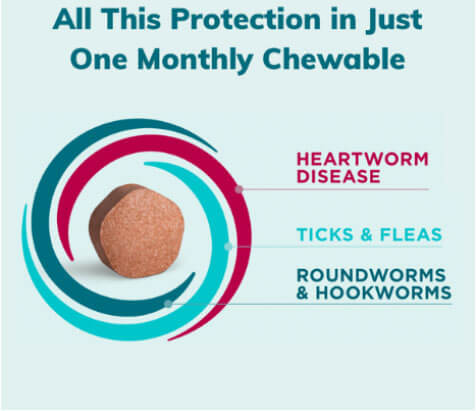Let's talk about the benefits of heartworm prevention. Heartworm disease is a serious health condition that can damage your dog's heart and cause lasting harm to their overall health and well-being. This disease begins long before patients develop any symptoms and continues to progress while heartworms are present.
How do dog’s develop heartworm disease?
Heartworm infection begins with the bite of an infected mosquito. Once bitten, the mosquito transfers infective larvae called microfilaria into the dog’s skin. Over the next 4-5 months, the larvae will find their way into the into the pulmonary arteries, where they will continue to mature into adults to then mate and produce offspring.
How do heartworm medications prevent heartworm disease?
According to the American Heartworm Society, heartworm medications work by eliminating the immature (larval) stages of the heartworm parasite. This includes the infective heartworm larvae deposited by the mosquito as well as the following larval stage that develops inside the animal.
Unfortunately, in as little as 51 days, heartworm larvae can molt into a juvenile/immature adult stage, which cannot be effectively eliminated by preventives. Because heartworms must be eliminated before they reach this adult stage, it is extremely important that heartworm preventives administered strictly on schedule. Administering prevention late can allow immature larvae to molt into the adult stage. After infection, every beat of the heart causes more damage.
How often should preventative medication be administered?
Year-round prevention is the safest, and is recommended by the American Heartworm Society, even in the cold Michigan winter months. Mosquito species are constantly changing and adapting to cold climates and some species successfully overwinter indoors as well. Heartworms must be approximately 7 months old before the infection can be diagnosed, so if you ever miss a dose of prevention, immediately re-start the preventative and call us to schedule a repeat test.
Can heartworm disease be treated?
While there are treatment options available for, prevention is always more effective than treatment when it comes to heartworm disease. Once infected, the heartworm larvae can cause severe damage to a dog's heart that may never be fully resolved.
Preventative medications are safer and less stressful for your dog. Treatment for heartworm disease can be extremely risky, requiring lengthy hospital stays and medications with serious side effects.
Does treatment cost more than prevention?
In short, YES!
Heartworm prevention, on average, costs $300-$400 per year. The cost of appropriate treatment for an active infection can initially range from $4,000-$5,000 over the course of 3 months, depending on the severity. The cost of prevention far outweighs the expense and concerns that come with treatment.
At Eastown Veterinary Clinic, we recommend Simparica Trio. Simparica Trio is the safest and most effective canine parasite prevention available. It protects against heartworms, fleas, ticks, roundworms and hookworms. That is a lot of protection from one tablet!
On average, with Simparica TRIO, a large dog's monthly coverage could cost around $38. That is $7.60 per annoying life-threatening parasite.
Want to learn more about Simparica TRIO or the other medications we offer from our convenient online pharmacy? Check them out here.
 In conclusion, preventative heartworm medications offer superior protection and significantly surpass treatment options in safety, efficiency, and cost. Monthly compliance with heartworm prevention measures provides you with confidence that your dog is free from the crippling effects of heartworms while enabling them to lead a happy, healthy, and comfortable life. Starting a pet on heartworm prevention without first testing for active heartworm infection is unsafe. Monthly preventative medications do not kill adult heartworms, so the pet will remain infected, and pet parents won't know until the pet shows signs of a serious problem. Heartworm testing is simple and quick, and medications can be started as soon as a negative test result is reported.
In conclusion, preventative heartworm medications offer superior protection and significantly surpass treatment options in safety, efficiency, and cost. Monthly compliance with heartworm prevention measures provides you with confidence that your dog is free from the crippling effects of heartworms while enabling them to lead a happy, healthy, and comfortable life. Starting a pet on heartworm prevention without first testing for active heartworm infection is unsafe. Monthly preventative medications do not kill adult heartworms, so the pet will remain infected, and pet parents won't know until the pet shows signs of a serious problem. Heartworm testing is simple and quick, and medications can be started as soon as a negative test result is reported.
Mosquito season is here! Please consult with a team member about our recommended prevention options.


